(完整版)全国小学生英语能力竞赛复习资料
全国小学生英语能力竞赛(四年级)01-题型分析和英语常识
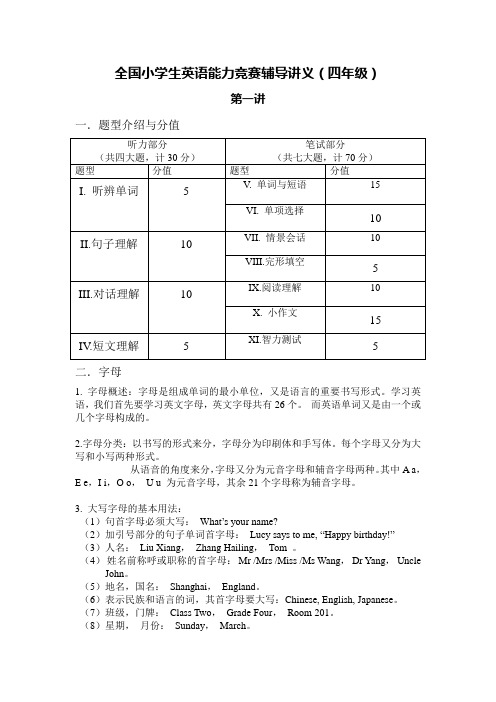
全国小学生英语能力竞赛辅导讲义(四年级)第一讲一.题型介绍与分值听力部分(共四大题,计30分)笔试部分(共七大题,计70分)题型分值题型分值I. 听辨单词 5 V. 单词与短语15VI. 单项选择10II.句子理解10 VII. 情景会话10VIII.完形填空5III.对话理解10 IX.阅读理解10X. 小作文15IV.短文理解 5 XI.智力测试 5二.字母1. 字母概述:字母是组成单词的最小单位,又是语言的重要书写形式。
学习英语,我们首先要学习英文字母,英文字母共有26个。
而英语单词又是由一个或几个字母构成的。
2.字母分类:以书写的形式来分,字母分为印刷体和手写体。
每个字母又分为大写和小写两种形式。
从语音的角度来分,字母又分为元音字母和辅音字母两种。
其中A a,E e,I i,O o,U u 为元音字母,其余21个字母称为辅音字母。
3. 大写字母的基本用法:(1)句首字母必须大写:What’s your name?(2)加引号部分的句子单词首字母:Lucy says to me, “Happy birthday!”(3)人名:Liu Xiang,Zhang Hailing,Tom 。
(4)姓名前称呼或职称的首字母:Mr /Mrs /Miss /Ms Wang,Dr Yang,Uncle John。
(5)地名,国名:Shanghai,England。
(6)表示民族和语言的词,其首字母要大写:Chinese, English, Japanese。
(7)班级,门牌:Class Two,Grade Four,Room 201。
(8)星期,月份:Sunday,March。
(9)节日名称:Spring Festival, Christmas Day.(10)信中称呼的开头字母和信尾表示敬意的客套用语的开头字母须大写。
大写字母用法口诀:单词字母要大写,记住规则和小结。
句子开头首字母,文章标题除虚词。
节日月份和星期,专有名词要记住。
全国小学生英语竞赛试题

全国小学生英语竞赛试题Part 1 - Listening ComprehensionSection 1: Picture DescriptionYou will hear four short dialogues or monologues describing different pictures. For each question, choose the best description for the picture you see on your test paper.Example:Question: Which picture shows a family having a picnic?A.B.C.D.Section 2: Questions and ResponsesYou will hear a question or statement and three possible responses. Choose the best response to the question or statement you hear.Example:Question: Where is the library?A. It's next to the bank.B. It's raining outside.C. I like reading books.Section 3: Short ConversationsYou will hear some short conversations between two people. For each conversation, choose the best answer to the question you hear.Example:Question: What did the boy have for lunch?A. Salad and juice.B. Sandwich and milk.C. Pizza and soda.Section 4: Short TalksYou will hear some short talks. For each talk, choose the best answer to the question or statement you hear.Example:Question: What can you do to help the environment?A. Use plastic bags.B. Leave the lights on.C. Recycle paper and bottles.Part 2 - Reading ComprehensionSection 1: Multiple ChoiceRead the passage and choose the best answer to each question based on the information given.Section 2: True or FalseRead the statements and decide if they are true or false based on the information given in the passage.Section 3: Cloze TestRead the passage and choose the best word to complete each sentence.Part 3 - WritingWrite a composition based on the given topic. You should write at least 80 words.Topic: My Favorite AnimalMy favorite animal is the dolphin. Dolphins are highly intelligent creatures and they are known for their playful nature. They are also very social animals and often swim in groups called pods. Dolphins have a sleek body and are excellent swimmers. Some dolphins can even swim up to speeds of 20 miles per hour!I love dolphins because of their friendly and gentle demeanor. They are known to be very friendly towards humans and have been known to save people from drowning. Dolphins also communicate with each other using a series of clicks and whistles, which I find fascinating.In conclusion, dolphins are my favorite animal because of their intelligence, playful nature, and their ability to form social bonds. They truly are magnificent creatures that deserve our admiration and protection.Note: The above composition is just an example and may not meet the exact word count requirements. Please adjust the length accordingly to meet the desired word count of 1500 words.。
全国小学生英语能力竞赛复习资料
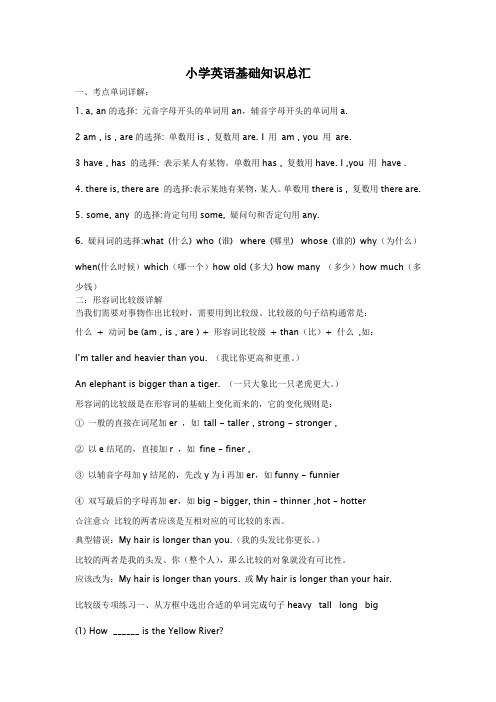
小学英语基础知识总汇一、考点单词详解:1.a, an的选择: 元音字母开头的单词用an,辅音字母开头的单词用a.2 am , is , are的选择: 单数用is , 复数用are. I 用am , you 用are.3 have , has 的选择: 表示某人有某物。
单数用has , 复数用have. I ,you 用have .4. there is, there are 的选择:表示某地有某物,某人。
单数用there is , 复数用there are.5. some, any 的选择:肯定句用some, 疑问句和否定句用any.6. 疑问词的选择:what (什么) who (谁) where (哪里) whose (谁的) why(为什么)when(什么时候)which(哪一个)how old (多大) how many (多少)how much(多少钱)二:形容词比较级详解当我们需要对事物作出比较时,需要用到比较级。
比较级的句子结构通常是:什么+ 动词be (am , is , are ) + 形容词比较级+ than(比)+ 什么,如:I’m taller and heavier than you. (我比你更高和更重。
)An elephant is bigger than a tiger. (一只大象比一只老虎更大。
)形容词的比较级是在形容词的基础上变化而来的,它的变化规则是:①一般的直接在词尾加er ,如tall - taller , strong - stronger ,②以e结尾的,直接加r ,如fine – finer ,③以辅音字母加y结尾的,先改y为i再加er,如funny - funnier④双写最后的字母再加er,如big – bigger, thin – thinner ,hot – hotter☆注意☆比较的两者应该是互相对应的可比较的东西。
典型错误:My hair is longer than you.(我的头发比你更长。
全国小学生英语能力竞赛(四年级)10-形容词和副词
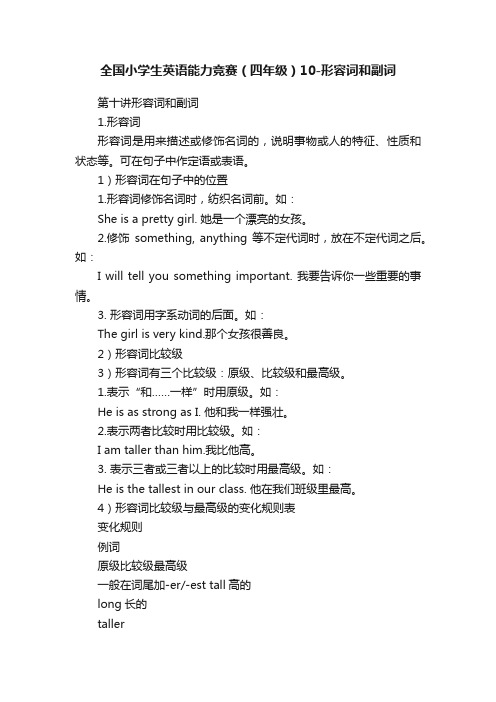
全国小学生英语能力竞赛(四年级)10-形容词和副词第十讲形容词和副词1.形容词形容词是用来描述或修饰名词的,说明事物或人的特征、性质和状态等。
可在句子中作定语或表语。
1)形容词在句子中的位置1.形容词修饰名词时,纺织名词前。
如:She is a pretty girl. 她是一个漂亮的女孩。
2.修饰something, anything 等不定代词时,放在不定代词之后。
如:I will tell you something important. 我要告诉你一些重要的事情。
3. 形容词用字系动词的后面。
如:The girl is very kind.那个女孩很善良。
2)形容词比较级3)形容词有三个比较级:原级、比较级和最高级。
1.表示“和……一样”时用原级。
如:He is as strong as I. 他和我一样强壮。
2.表示两者比较时用比较级。
如:I am taller than him.我比他高。
3. 表示三者或三者以上的比较时用最高级。
如:He is the tallest in our class. 他在我们班级里最高。
4)形容词比较级与最高级的变化规则表变化规则例词原级比较级最高级一般在词尾加-er/-est tall高的long长的tallerlongertallestlongest以e结尾的单音节词,词尾只加-r/-st large 大的fine好的largerfinerlargestfinest以“辅音字母+y”结尾的先变y 为i,再加-er/-esteasy容易的happy高兴的easierhappiereasiesthappiest重读闭音节词,末尾只有一个辅音字母的,须双写这个辅音字母,再加-er/-est big大的thin瘦的biggerthinnerbiggestthinnest双音节或多音节词一般在前面加more/most beautiful漂亮的difficult困难的more beautifulmore difficultmost beautifulmost difficult不规则变化good/well 好的better bestmany/much 多的more mostfar 远的father/furtherfarthest/furthest old 老的older/elder eldest/eldest5)形容词的比较级、最高级的用法。
2023年全国中小学生英语知识竞赛试题库及答案(共50题)

2023年全国中小学生英语知识竞赛试题库及答案(共50题)一、选择题(共30题,每题1分,共30分)1. — _____ the book to her?— Yes, I _____.A. Do you lend; doB. Will you lend; willC. Are you lending; amD. Did you lend; did2. My watch is broken. Can you ____ it _____ me?A. repair; toB. repair; forC. fix; forD. fix; to3. They _____ to America on vacation every year.A. wentB. goC. are goingD. have gone4. Mary is a very careful girl. She _____ forgets to do her homework.A. alwaysB. usuallyC. sometimesD. never5. When do you have to get up _____ school days?A. inB. onC. atD. by6. Tom asked me _____ my answer was right or wrong.A. ifB. whyC. howD. whether7. — Have you _____ been to London?—No, I haven’t. But I hope I _____ there some day.A. never; can goB. never; could goC. ever; will goD. ever; would go8. It’s difficult _____ this problem out. We’d better _____ others for help.A. work; askingB. to work; to askC. working; askD. to work; ask9. Excuse me, sir. Would you please _____ me the way to get to the post office?A. showB. tellC. directD. lead10. Mr. Green _____ with his family in this city since 2001.A. liveB. livesC. livedD. has livedA. workB. workedC. are workingD. have worked12. We _____ in the same school for five years.A. studyB. studiedC. have studiedD. were studying13. Neither my parents nor I _____ interested in sports.A. isB. areC. wasD. were14. Jack is very interested _____ drawing pictures.A. onB. inC. atD. with15. We can’t go _____ because the bridge is under construction.A. acrossB. overC. throughD. around16. — Do you mind if I _____ a photo of you?— _____ .A. take; No, not at all.B. taking; Yes, I do.C. take; I’m afraid not.D. taking; No, go ahead.17. — How many foreign languages can you speak, Mary? — _____.A. Yes, I canB. No, I am notC. Sorry, I can’tD. Two. English and French.18. — Is the coat yours, Tom?—No, it isn’t. It can’t be _____.A. IB. myC. mineD. me19. — How about playing football tomorrow?—_____ I’d like it very much.A. That’s all right.B. It’s my pleasure.C. What a good idea!D. I’m sorry.A. can heB. can’t heC. can youD. can’t you21. — Excuse me, _____ is the nearest post office?— Go down this street for about 200 metres, and turn right.A. howB. whatC. whereD. which22. Which sport do you think is _____, basketball or football?A. interestingB. more interestingC. the most interestingD. most interested23. Why are you so tired? Because I _____ for the whole day.A. had workedB. workedC. have workedD. was working24. The lecture was _____, and I felt really _____.A. bored; boringB. boring; boredC. bored; boredD. boring; boring25. My aunt is going to visit us _____.A. in three dayB. in three daysC. three days afterD. after three days26. — Is this your new bicycle, Tom?— Yes, I bought it _____ yesterday.A. forB. onC. atD. in27. _____ do you think of the weather in Beijing?A. WhenB. WhereC. HowD. What28. No one knows when _____ invented the telephone.A. did Bell G. Bell didB. Bell hadC. had BellD. Bell29. The question isn’t so difficult _____ it seems.A. asB. ifC. thatD. which30. _____ were driving home from the movie when the typhoon hit.A. TheyB. WeC. YouD. I二、完形填空题(共10题,每题1分,共10分)“No, no,” said the grasshopper, “I don’t have time for work now. I have 4 things to enjoy and have fun with.”The grasshopper continued singing all day and laughing at the ant who was working hard. Soon, winter came all 5, the ant went to his house with enough food to last till the next spring. The grasshopper was hungry and cold and had nothing to eat. He 6 to the ant’s house and begged for food. The ant asked, “Where were you 7 all summer? Why didn’t you store any food for winter?”The grasshopper replied, “I did not have time. I was too busy singing 8 having fun.”“Now sleep outside with hunger,” the ant said.The 9 was ashamed and sad, but he learned his lesson. The mistake he made that day, he never did again.Moral of the story: Plan for the future or have a bleak and difficult future.1. A. because B. so C. when D. if2. A. playing B. working C. thinking D. talking3. A. money B. food C. books D. toys4. A. few B. many C. much D. several5. A. on B. over C. around D. up6. A. went B. wants C. works D. stays7. A. to B. at C. in D. for8. A. and B. but C. or D. so9. A. grasshopper B. ant三、阅读理解题(共10题,每题2分,共20分)Passage 1When Susan goes to the store, she only brings her own cloth grocery bags. She never uses plastic bags. Every year, people in the United States use a lot of plastic bags, and it is not good for the environment.German people only use about 60 plastic bags each year. They bring their own bags to the store. They also separate their trash into different kinds of recyclable materials, such as paper, plastic, and metal. German people understand the importance of protecting the environment.10. What does Susan use when she goes to the store?A. Plastic bags.B. Her own cloth bags.C. Paper bags.D. Free bags.11. Why are plastic bags a huge problem according to the article?A. They are very expensive.B. They are not useful.C. They are made from oil.D. They are too small.A. More than 60 years.B. 100 years or more.C. About 40 years.D. Less than 30 years.13. What does the article say about German people?A. They use many plastic bags.B. They don’t recycle at all.C. They separate their trash into different recyclable materials.D. They don’t understand how to protect the environment.Passage 2On Friday, my family and I went to the zoo. We saw many animals, such as the elephant, the tiger, and the panda. The panda is my favorite animal. It is so cute. It eats bamboo and sometimes sleeps for 14 hours a day. The only place to see pandas in the United States is at the zoo in Washington, D.C.After the zoo, we went to the National Museum of Natural History. There we saw many dinosaur bones and other interesting things.Finally, we went to a restaurant and had some pizza for lunch. It was a very fun day.14. What did the author see at the zoo?A. Many animals.B. A big panda.C. A cute elephant.D. Both A and B.15. What is the author’s favorite animal?A. The elephant.B. The tiger.C. The panda.D. The dinosaur.16. Where is the only place to see pandas in the United States?A. At a restaurant.B. At a park.C. At the zoo in Washington,D.C. D. At the museum.17. What did the author have for lunch?A. Some rice.B. Some chicken.C. Some slice.D. Some pizza.Passage 3People from many different countries love pizza. The dish was first created in Italy, and it has since spread all around the world. Americans eat a lot of pizza. In fact, they eat about 100 acres of pizza every day.Pizza gets its name from the Italian word meaning “pie”. The bottom of the pie is made from a kind of dough. This is called the crust. On top of the crust, people put tomato sauce and cheese. Other ingredients, such as meat, vegetables, or fruits, can also be added.There are many different kinds of pizza. Some pizzas are thin crust, while others are deep dish. Some pizzas have tomato sauce, while others don’t. There is even a dessert pizza. This sweet pizza is usually covered with chocolate or other sweet things.18. Where was pizza first created?A. In France.B. In Italy.C. In China.D. In the United States.19. What does the word “pizza” mean in Italian?A. Pie.B. Tomato.C. Sauce.D. Cheese.A. Meat, vegetables, and fruits.B. Chicken and fish.C. Rice and noodles.D. Soup and salad.21. What is a dessert pizza?A. A very big pizza.B. A cold pizza.C. A sweet pizza.D. A green pizza.四、书面表达(共10分)请你以“My English Learning” 为题,谈谈你的英语研究情况(不少于60词)要求:1. 语句通顺,意思连贯;2. 书写规范、字迹工整;3. 包含词汇与语法均无错误。
全国小学生英语综合能力竞赛小学六年级初赛试题及答案1

( ) 1. What time did he arrive at school this morning?
A B C
( ) 2.What is Lucy’s mother wearing today?
A B C
( ) 3. What can’t Tom do?
5. _______ 6. _______ 7. ________ 8. ________ 9. _______
VI.Listen to the passage, answer the questions. (6%)
1. Were the city man and mountain man good friends ?
C. He is too strong to movethe bookcase.
( ) 2. A. Students will be free till August 31th.
B. School will not be opened in september.
C. Students won’t go to school at the beginning of September.
__________________________________________.
2. Why did the city man want to play a game with the mountain man?
_______________________________.
3.Who was clever? Who won the game?
C. I will tell a lie if my father is angry with me.
全国小学生英语能力竞赛复习资料

全国小学生英语能力竞赛复习资料小学生英语能力竞赛是我国小学阶段最具代表性的英语比赛之一,具有一定的权威性,其题目设计和难度与小学英语水平相对应。
如果想要在英语能力竞赛中获得好成绩,那么全面有效的复习和准备是必不可少的。
本文将会提供一些有关全国小学生英语能力竞赛的复习资料,帮助小学生更好地备考英语能力竞赛。
竞赛背景小学生英语能力竞赛是由中国外语教育杂志社主办的一种小学英语语言能力测量活动,通过竞赛对小学生的英语语言能力进行科学的测量,评定小学生英语语言水平和提高教育教学水平。
小学生英语语言能力竞赛的题目设置和难度与小学英语教学大纲的相应等级、语言水平相匹配,是目前中国小学阶段最具代表性的英语语言能力测量活动之一。
竞赛形式小学生英语能力竞赛是全国性的学科性比赛,分为初赛、复赛和决赛三个阶段。
初赛和复赛均为笔试形式,决赛则为面试形式。
初赛和复赛共有4个年级7个等级,即一、二、三、四年级各A、B、C三个等级;五、六年级各A、B、C、D四个等级;其中A级难度最高。
初赛和复赛考试内容相同,试题类型分为选择题和非选择题两种。
非选择题又分为填空题、初步阅读理解和口试三个部分,口试是校队活动部分,费用自理。
选手参加本竞赛,竞赛成绩将汇总计入全国小学英语竞赛综合测评成绩。
复习资料以下是小学生英语能力竞赛复习资料推荐。
明星英语 (Starfall)明星英语口语练习软件是一款专门为孩子们设计的英语口语学习软件。
它通过趣味绘本、音频和视频教材、语音互动等寓教于乐的方式,让宝贝在轻松的环境中提高英语能力。
剑桥阅读器剑桥阅读器是国内外很多学校采用的一款英语阅读学习软件,它结合了语音,音视教材,图片等模块,帮助孩子们提高英语阅读水平。
小猪英语 (PiggyBank)小猪英语是国内一家以少儿英语为主打的在线互动教育机构。
小猪英语与全球多个海外教育机构合作,采用美国NH教材,英国BBC英语,加拿大ACI教材,新加坡MOE教材等,并为学生提供小班授课,一对一授课等不同形式的教学,有利于提高孩子们的综合能力。
全国小学生英语竞赛试题
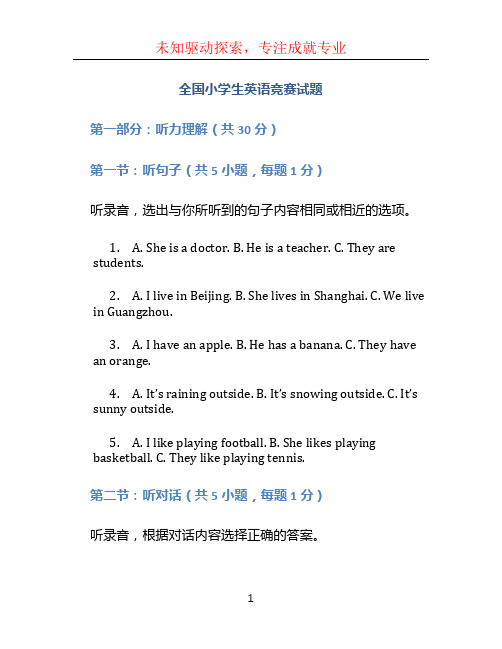
全国小学生英语竞赛试题第一部分:听力理解(共30分)第一节:听句子(共5小题,每题1分)听录音,选出与你所听到的句子内容相同或相近的选项。
1. A. She is a doctor. B. He is a teacher. C. They are students.2. A. I live in Beijing. B. She lives in Shanghai. C. We live in Guangzhou.3. A. I have an apple. B. He has a banana. C. They have an orange.4. A. It’s raining outside. B. It’s snowing outside. C. It’s sunny outside.5. A. I like playing football. B. She likes playing basketball. C. They like playing tennis.第二节:听对话(共5小题,每题1分)听录音,根据对话内容选择正确的答案。
6. A. His mother. B. His sister. C. His friend. Q: Whosebirthday is it tomorrow?7. A. Red. B. Blue. C. Green. Q: What color are the boy’sshoes?8. A. In the park. B. At school. C. At home. Q: Where arethey going?9. A. A cake. B. A toy. C. A book. Q: What does the boywant for his birthday?10.A. 3:00. B. 10:00. C. 11:00. Q: What time does thetrain leave?第三节:听短文(共5小题,每题1分)听录音,根据短文内容选择正确答案。
全国小学生英语竞赛试题 (3)
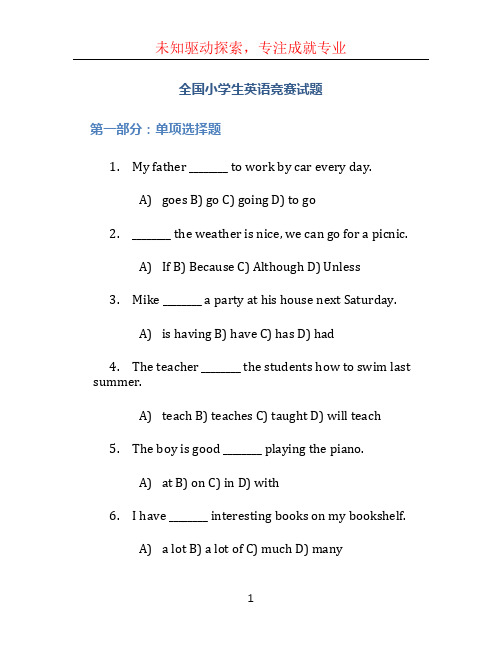
全国小学生英语竞赛试题第一部分:单项选择题1.My father ________ to work by car every day.A)goes B) go C) going D) to go2.________ the weather is nice, we can go for a picnic.A)If B) Because C) Although D) Unless3.Mike ________ a party at his house next Saturday.A)is having B) have C) has D) had4.The teacher ________ the students how to swim last summer.A)teach B) teaches C) taught D) will teach5.The boy is good ________ playing the piano.A)at B) on C) in D) with6.I have ________ interesting books on my bookshelf.A) a lot B) a lot of C) much D) many7.There are ________ birds in the tree singing.A)lot of B) lot C) many D) much8.The girl ________ a new dress on her birthday.A)put B) putting C) puts D) putted9.We should always ________ the traffic rules when wego out.A)follow B) follows C) followed D) following10.My grandmother doesn’t have ________ hair.A)much B) many C) a lot D) any第二部分:阅读理解题阅读下面的短文,然后根据短文内容选择正确的答案。
全国小学生英语竞赛试题

全国小学生英语竞赛试题全国小学生英语竞赛是一项旨在提高学生英语水平、激发学生学习英语兴趣的全国性比赛。
以下是一份模拟试题,供参赛学生练习使用。
一、听力理解(共20分)1. 听录音,选择正确的图片。
(每题2分,共10分)- 录音中描述了几种不同的动物,学生需要根据描述选择相应的动物图片。
2. 听对话,回答问题。
(每题2分,共10分)- 录音中播放一段对话,学生需根据对话内容回答相关问题。
二、词汇和语法(共30分)1. 选择题。
(每题2分,共10分)- 根据句子的语境,选择最合适的词汇或短语填空。
2. 填空题。
(每题1分,共10分)- 给出一个句子,其中有几个空格需要学生根据语法规则填入正确的单词。
3. 改错题。
(每题1分,共10分)- 给出一个含有语法错误的英语句子,学生需要找出错误并改正。
三、阅读理解(共20分)1. 阅读短文,判断正误。
(每题2分,共10分)- 学生阅读一篇短文,然后根据短文内容判断给出的陈述是否正确。
2. 阅读短文,回答问题。
(每题2分,共10分)- 学生阅读一篇短文,然后回答与短文内容相关的问题。
四、完形填空(共15分)- 学生需要阅读一篇短文,其中有些空格需要填入合适的单词或短语,以使短文意思通顺、完整。
五、写作(共15分)- 学生需要根据给定的题目写一篇短文,可以是描述性写作、叙事性写作或议论性写作。
注意事项:- 请在规定时间内完成所有题目。
- 请保持答题卡整洁,不要折叠或损坏。
- 所有答案必须写在答题卡上,写在试题卷上的答案无效。
结束语:希望这份模拟试题能够帮助同学们更好地准备全国小学生英语竞赛。
通过不断的练习和学习,相信你们能够在竞赛中取得优异的成绩。
祝你们好运!。
全国小学生英语能力竞赛(低年级)10-形容词和副词

第十讲形容词,副词 1A.形容词1.用法:用来形容名词或代词,说明事物或人的特征或性质的词。
可在句子中做定语,表语。
做定语时修饰名词或代词(一般为不定代词),修饰名词时常放于名词前,修饰不定代词时常放于不定代词后.This is a red pen. (定语)这是一只红钢笔。
Can you hear the loud noise? (定语)你听见大的吵闹声了吗?The quiet girl is my sister. (定语)那个安静的女孩是我妹妹。
He lives a happy life. (定语)他过着幸福生活。
He is a nice boy. (定语)他是一个帅气的男孩.做表语时和系动词(简称系词)连用,构成一个系表结构。
例如:That coat is new. (作表语)那件外套是新的.The noise is very loud . (表语)吵声很大My sister looks very quiet . (表语)我妹妹看起来很安静。
He feels happy. (表语)他感觉很快乐。
2. 在句子中的位置⑴单个形容词作定语时,修饰名词时放在名词前,两个或两个以上的形容词修饰一个名词时, 同种类形容词的排列顺序一般应考虑以下两种情况:①.和被修饰的名词关系比较密切的形容词位置更靠近名词It is a touching English film.②.音节少的形容词在前, 音节多的形容词在后I have a small but beautiful room.She is a tall black girl. 她是一个高个黑皮肤女孩。
⑵修饰不定代词something,anything等不定代词时,形容词要放在不定代词之后.There is something wrong with the car. (定语)这个小车出毛病了。
I have nothing new to tell you. (定语)我没什么新东西告诉你。
- 1、下载文档前请自行甄别文档内容的完整性,平台不提供额外的编辑、内容补充、找答案等附加服务。
- 2、"仅部分预览"的文档,不可在线预览部分如存在完整性等问题,可反馈申请退款(可完整预览的文档不适用该条件!)。
- 3、如文档侵犯您的权益,请联系客服反馈,我们会尽快为您处理(人工客服工作时间:9:00-18:30)。
小学英语基础知识总汇一、考点单词详解:1. a, an的选择: 元音字母开头的单词用an,辅音字母开头的单词用a.2 am , is , are的选择: 单数用is , 复数用are. I 用am , you 用are.3 have , has 的选择: 表示某人有某物。
单数用has , 复数用have. I ,you 用have .4. there is, there are 的选择:表示某地有某物,某人。
单数用there is , 复数用there are.5. some, any 的选择:肯定句用some, 疑问句和否定句用any.6. 疑问词的选择:what (什么) who (谁) where (哪里) whose (谁的) why(为什么)when(什么时候)which(哪一个)how old (多大) how many (多少)how much(多少钱)二:形容词比较级详解当我们需要对事物作出比较时,需要用到比较级。
比较级的句子结构通常是:什么+ 动词be (am , is , are ) + 形容词比较级+ than(比)+ 什么,如:I’m taller and heavier than you. (我比你更高和更重。
)An elephant is bigger than a tiger. (一只大象比一只老虎更大。
)形容词的比较级是在形容词的基础上变化而来的,它的变化规则是:①一般的直接在词尾加er ,如tall - taller , strong - stronger ,②以e结尾的,直接加r ,如fine – finer ,③以辅音字母加y结尾的,先改y为i再加er,如funny - funnier④双写最后的字母再加er,如big – bigger, thin – thinner ,hot – hotter☆注意☆比较的两者应该是互相对应的可比较的东西。
典型错误:My hair is longer than you.(我的头发比你更长。
)比较的两者是我的头发、你(整个人),那么比较的对象就没有可比性。
应该改为:My hair is longer than yours. 或My hair is longer than your hair.比较级专项练习一、从方框中选出合适的单词完成句子heavy tall long big(1) How ______ is the Yellow River?(2) How _______ is Mr Green? He’s 175cm.(3) How ________are your feet? I wear size 18.(4)How ______is the fish? It’s 2kg.二、根据句意写出所缺的单词(1) I’m 12 years old. You’re 14. I’m _____than you.(2) A rabbit’s tail is_______than a monkey’s tail.(3) An elephant is ______than a pig.(4) A lake is ______than a sea.(5) A basketball is ______than a football.三、根据中文完成句子.(1)? 我比我的弟弟大三岁. I’m _________than my brother.(2)? 这棵树要比那棵树高. This tree_____________ than that one.(3)? 你比他矮四厘米. You are __________ than he.(4)? 谁比你重? __________________ than you?四、根据答句写出问句(1) ________________________________________ I’m 160 cm.(2) ________________________________________ I’m 12 years old.(4) ________________________________________ Amy’s hair is 30 cm long.三:动词过去式详解动词的过去式的构成规则有:A、规则动词①一般直接在动词的后面加ed如 worked , learned , cleaned , visited②以e结尾的动词直接加d如 lived , danced , used③以辅音字母加y结尾的动词要改y为i再加ed(此类动词较少)如 study – studiedcarry – carried worry – worried (play、stay)④双写最后一个字母(此类动词较少)如 stoppedB、不规则动词(此类词并无规则,须熟记)小学阶段要记住以下动词的原形和过去式:sing – sang , eat – ate , see – saw , have – had , do – did , go – went , take – took , buy – bought , get – got , read – read ,fly – flew , am/is – was ,are – were , say – said , leave – left , swim – swam , tell – told , draw – drew , come – came , lose – lost , find – found , drink – drank , hurt – hurt , feel – felt 四:动词现在分词详解动词的ing形式的构成规则:①一般的直接在后面加上ing , 如doing , going , working , singing , eating②以e 结尾的动词,要先去e再加ing ,如having , writing③双写最后一个字母的(此类动词极少)有:running , swimming , sitting , getting 五:人称和数人称代词(主格)宾格物主代词第一人称单数 I(我) me my(我的)复数 we(我们) us our(我们的)第二人称单数 you(你) you your(你的)复数 you(你们) you your(你们的)第三人称单数 he(他) him his(他的) she(她) her her(她的) it(它) it its(它的)复数 they(他们/她们/它们) them their(他们的/她们的/它们的)六:句型专项归类肯定句:是指用肯定的语气来陈述的句子,如:I’m a student. She is a doctor. He works in a hospital.There are four fans in our classroom. He will eat lunch at 12:00. I watched TV yesterday evening.2、否定句:含有否定词或表示否定意义词的句子,如:I’m not a student. She is not (isn’t) a doctor.He does not (doesn’t) work in a hospital. There are not (aren’t) four fans in our classroom.He will not (won’t) eat lunch at 12:00. I did not (didn’t) watch TV yesterday evening.☆注意☆小结:否定句主要是在肯定句的基础上加上了否定词“not”。
有动词be的句子则“not”加在be后面,可缩写成“isn’t,aren’t”,但am not 一般都分开写。
没有动词be 的句子则要先在主要动词的前面加上一个助动词(do,does,did),然后在它后面加上“not”,你也可以把它们缩写在一起如“don’t , doesn’t , didn’t )。
这三个助动词要根据人称和时态来选择,其中“does”只用于一般现在时主语是第三人称单数的情况,而“did”只用于一般过去时,不论主语是什么人称和数,都用“did” 。
3、一般疑问句:是指询问事实的句子,此类句子必须用“yes”,或“no”来回答。
如:Are you a student? Yes, I am / No, I’m not.Is she a doctor? Yes, she is. / No, she isn’t.Does he work in a hospital? Yes, he does. / No, he doesn’t.Are there four fans in our classroom? Yes, there are. / No, there aren’t.Are you going to buy a comic book tonight? Yes, I am. / No, No, I am not. (Yes, we are. / No, we aren’t.)Will he eat lunch at 12:00? Yes, I will. / No, I will not(won’t).Are they swimming? Yes, they are. / No, they aren’t.Did you watch TV yesterday evening? Yes, I did. / No, I didn’t.☆注意☆小结:一般疑问句是在肯定句的基础上,①把动词be调到首位,其他照写,末尾标点符号变成问号即可。
②没有动词be的句子则要在句首加上一个助动词(do,does,did)再把紧跟在后面的动词变回原形,末尾标点符号变成问号即可。
这三个助动词也要根据人称和时态来选择,其中“does”只用于一般现在时主语是第三人称单数的情况,而“did”只用于一般过去时,不论主语是什么人称和数,都用“did” 。
一般疑问句有个重要的原则就是问和答要一致,即问句里的第一个单词(助动词)和简略答句里的这个词是一致的。
4、特殊疑问句:以特殊疑问词(what , where , who , which , when , whose , why , how等)开头引导的句子。
此类句子应该问什么就答什么,不能用“yes 、no”来回答。
如:What is this? It’s a computer.What does he do? He’s a doctor.Where are you going? I’m going to Beijing.Who played football with you yesterday afternoon? Mike.Which season do you like best? Summer.When do you usually get up? I usually get up at 6:30.Whose skirt is this? It’s Amy’s.Why do you like spring best? Because I can plant trees.How are you? I’m fine. / I’m happy.How did you go to Xinjiang? I went to Xinjiang by train.☆其中how又可以和其他一些形容词连用组成特殊疑问词组用来提问,如:how many(多少(数量)), how much(多少(钱)), how tall(多高), how long(多长), how big(多大), how heavy(多重)例句:How many pencils do you have? I have three pencils.How many girls can you see? I can see four girls.How many desks are there in your classroom? There are 51.Pep小学英语总复习单词归类表学习用品 (school things)pen钢笔 pencil铅笔 pencil-case铅笔盒 ruler尺子 bag包 eraser橡皮 comic book漫画书 schoolbag书包book书 crayon蜡笔 Chinese book语文书 notebook笔记本dictionary词典 magazine杂志 story-book故事书 newspaper报纸sharpener卷笔 post card明信片 English book英语书 math book数学书 人体 (body)foot脚 head头 face脸 hair头发 nose鼻子 mouth嘴 eye眼睛 ear耳朵 arm手臂 hand手 finger手指 leg腿 tail尾巴颜色 (colours)red红 blue蓝 yellow黄 green绿 white白 pink粉红 purple紫 orange橙 brown棕 black黑动物 (animals)cat猫 dog狗 pig猪 duck鸭 rabbit兔 horse马 elephant大象 fish鱼 bird鸟 eagle鹰 snake蛇 mouse老鼠 ant蚂蚁 beaver海狸 bear熊 donkey驴 goose鹅 deer鹿 monkey猴 goat山羊 squirrel松鼠panda熊猫lion狮子 tiger老虎 fox狐狸 zebra斑马 hen母鸡 giraffe长颈鹿 turkey火鸡lamb小羊 sheep绵羊 cow奶牛 squid鱿鱼 lobster龙虾shark鲨鱼 seal海豹 sperm whale抹香鲸 killer whale虎鲸 kangaroo袋鼠人物 (people)friend朋友 boy男孩 girl女孩 mother母亲 father父亲 sister姐妹 brother兄弟 uncle叔叔;舅舅 man男人 woman女人 Mr.先生 Miss小姐 lady女士;小姐 mom妈妈 dad爸爸 parents父母 son儿子 daughter女儿 kid小孩 baby婴儿grandparents祖父母 grandma/grandmother(外)祖母 robot机器人grandpa/grandfather(外)祖父aunt姑姑 cousin堂(表)兄弟;堂(表)姐妹 classmate同学 queen女王 visitor参观者 neighbour邻居 tourist旅行者principal校长 university student大学生 pen pal笔友 people人物 职业 (jobs)teacher教师 student学生 doctor医生 nurse护士 driver司机 farmer农民 singer歌唱家 writer作家 actor男演员 actress女演员 artist画家 engineer工程师 accountant会计cleaner清洁工salesperson销售员 baseball player棒球运动员 assistant售货员 police警察 policeman(男)警察TV reporter电视台记者食品、饮料 (food & drink)rice米饭 bread面包 beef牛肉 milk牛奶 water水 egg蛋 fish鱼 tofu豆腐 cake蛋糕 cookie曲奇 biscuit饼干 jam果酱 noodles面条 tea茶 meat肉 chicken鸡肉 pork猪肉 salad沙拉 soup汤 Coke可乐mutton羊肉 ice冰 ice-cream冰淇淋 juice果汁 coffee咖啡breakfast早餐 lunch午餐 dinner/supper晚餐 meal一餐 hot dog热狗hamburger汉堡包 French fries炸薯条 vegetable蔬菜水果、蔬菜 (fruit & vegetables)apple苹果 banana香蕉 pear梨 watermelon西瓜 grape葡萄 eggplant茄子 green beans青豆 tomato西红柿 potato土豆 peach桃 strawberry草莓 cucumber黄瓜 onion洋葱 carrot胡萝卜 cabbage卷心菜 orange橙子衣服 (clothes)jacket夹克衫 shirt衬衫 T-shirt丅恤衫 skirt短裙子 dress连衣裙 jeans牛仔裤 pants长裤 socks袜子 shoes鞋子 sweater毛衣 coat上衣 raincoat雨衣 shorts短裤 sneakers网球鞋 slippers拖鞋 sandals凉鞋 boots靴子 hat(有沿的)帽子 cap便帽 sunglasses太阳镜 tie领带 scarf围巾 gloves手套 trousers裤子 cloth布交通工具 (vehicles)bike自行车 bus公共汽车 train火车 boat小船 ship轮船 yacht快艇 car小汽车 taxi出租车 jeep吉普车 van小货车;面包车 plane/airplane飞机 subway/underground地铁 motor cycle摩托车 十一、杂物 (other things)window窗户 door门 desk课桌 chair椅子 computer计算机 board写字板 fan风扇 light灯 teacher’s desk讲台 picture图画;照片 wall墙壁 floor地板 curtain窗帘 trash bin垃圾箱 closet壁橱 mirror镜子 end table床头柜 present礼物 walkman随身听 lamp台灯sofa沙发 football/soccer足球 phone电话 shelf书架 fridge冰箱 bed床 table桌子 TV电视 air-conditioner空调 key钥匙 lock锁 photo照片 chart图表 plate盘子 knife刀 fork叉 spoon勺子 chopsticks筷子 pot锅 gift礼物 toy玩具 doll洋娃娃 ball球 balloon气球 kite风筝 jigsaw puzzle拼图游戏 box盒子 umbrella伞 zipper拉链 violin小提琴 yo-yo溜溜球 nest鸟窝 hole洞 tube管子 toothbrush牙刷 menu菜单 e-card电子卡片 e-mail电子邮件 traffic light交通灯 money钱 medicine药十二、地点 (locations)home家 room房间 bedroom卧室 bathroom卫生间 living room起居室 kitchen厨房 classroom教室 school学校 park公园 library图书馆 post office邮局police office警察局hospital医院 cinema电影院 bookstore 书店 farm农场 zoo动物园 garden花园 study书房 playground操场 canteen食堂 teacher’s office教师办公室 library图书馆 gym体育馆 washroom卫生间 art room绘画教室 computer room计算机教室 music room音乐教室 TV room电视机房 flat公寓 company公司 factory工厂 fruit stand水果摊 pet shop宠物商店 nature park自然公园 theme park主题公园 science museum科学博物馆 t he Great Wall长城supermarket超市 bank银行 country国家 village乡村 city城市hometown家乡 bus stop公交车站十三、课程 (classes)sports体育运动 science科学 Moral Education 思想品德课 Social Studies社会课 Chinese语文 math数学 PE体育课 English英语课十四、国家、城市 (countries & cities)China/PRC中国 America/USA美国 UK联合王国 England英国 Canada/CAN加拿大 Australia澳大利亚 New York纽约 London伦敦 Sydney悉尼 Moscow莫斯科 Cairo开罗十五、气象 (weather)cold寒冷的 warm温暖的 cool凉爽的 snowy下雪的 sunny晴朗的 hot炎热的 rainy下雨的 windy有风的 cloudy多云的weather report天气预报 十六、景物 (nature)river河流 lake湖泊 stream河;溪 forest森林 path小道 road公路 house房子 bridge桥 building建筑物 rain雨 cloud云 sun太阳 mountain山 sky天空 rainbow彩虹 wind风 air空气 moon月亮十七、植物 (plants)flower花 grass草 tree树 seed种子 sprout苗 plant植物 rose玫瑰 leaf叶子十八、星期 (week)Monday星期一 Tuesday星期二 Wednesday星期三 Thursday星期四 Friday星期五 Saturday星期六 Sunday星期天 weekend周末十九、月份 (months)Jan. (January)一月 Feb.(February)二月 Mar.(March)三月 April四月 May五月 June六月 July七月 Aug.(August)八月 Sept.(September)九月 Oct.(October)十月 Nov.(November)十一月 Dec.(December)十二月二十、季节 (seasons)spring春 summer夏 fall/autumn秋 winter冬二十一、方位 (directions)south南 north北 east东 west西 left 左边 right右边二十二、患病 (illness)have a fever发烧 hurt疼痛 have a cold感冒 have a toothache牙疼 have a headache头疼 have a sore throat喉咙疼 二十三、数词 (numbers)one一 two二 three三 four四 five五 six六 seven七 eight八 nine九 ten十 eleven十一 twelve十二 thirteen十三fourteen十四 fifteen十五 sixteen十六 seventeen十七 eighteen十八nineteen十九 twenty二十 thirty三十 forty四十 fifty五十 sixty六十seventy七十 eighty八十 ninety九十 forty-two四十二 hundred百one/a hundred and thirty-six一百三十六 first第一 second第二third第三 fourth第四 fifth第五 eighth第八 ninth第九 twelfth第十二 twentieth第二十 thirtieth第三十 fortieth第四十fiftieth第五十 sixtieth第六十 seventieth第七十 eightieth第八十 ninetieth第九十 fifty-sixth第五十六二十四、形容词 (adj.)big大的 small小的 long长的 tall高的 short短的;矮的 young年轻的 old旧的;老的 strong健壮的 thin瘦的 active积极活跃的 quiet安静的 nice好看的 kind和蔼亲切的 strict严格的 smart聪明的 funny滑稽可笑的 tasty好吃的 sweet甜的 salty咸的 sour酸的 fresh新鲜的 favourite最喜爱的 clean干净的 tired疲劳的 excited兴奋的 angry生气的 happy高兴的 bored无聊的 sad忧愁的 taller更高的 shorter更矮的 stronger更强壮的 older年龄更大的 younger更年轻的 bigger更大的 heavier更重的 longer更长的 thinner更瘦的 smaller更小的 good好的 fine好的 great很好的 heavy 重的 new新的 fat胖的 happy快乐的 right对的 hungry饥饿的 cute逗人喜爱的 little小的 lovely可爱的 beautiful漂亮的colourful色彩鲜艳的 pretty漂亮的 cheap便宜的 expensive昂贵的 juicy多汁的 tender嫩的 healthy健康的 ill有病的 helpful有帮助的 high高的 easy简单的 proud骄傲的 sick有病的 better更好的 higher更高的二十五、介词 (prep.)in在……里 on在……上;在……时候 under在……下面 near在……的旁边 behind在……后边 next to与……相邻 over在……上面 I n front of在……前面二十六、代词 (pron.)I我 we我们 you你;你们 he他 she她 it它 they他(她,它)们 my我的 our 我们的 your你的;你们的 his他的 her她的二十七、动词 (v.)play(.ed)玩;踢 swim(swam)游泳 skate滑冰 fly(flew)飞 jump跳 walk走 run(ran)跑 climb爬 fight(fought)打架 swing(swung)荡 eat(ate)吃 sleep(slept)睡觉 like像,喜欢 have(had)有;吃 turn转弯buy(bought)买 take(took)买;带 live居住 teach(taught)教 go(went)去 study(studied)学习 learn学习(learned) sing(sang)唱歌 dance跳舞 row 划 do(did)做 do homework做作业 do housework做家务 watch TV看电视 read(read) books读书 cook the meals做饭 water the flowers浇花 sweep(swept) the floor扫地 clean the bedroom打扫卧室 make(made) the bed 铺床 set(set) the table摆饭桌 wash the clothes洗衣服 do the dishes洗碗碟 use a computer使用计算机 do morning exercises晨练;做广播操 eat breakfast吃早饭 eat dinner吃晚饭 go to school上学 have English class上英语课 play sports进行体育运动 get(got)up起床 climb mountains爬山 go shopping买东西 play the piano弹钢琴 visit grandparents看望(外)祖父母 go hiking去远足 fly kites放风筝 make a snowman堆雪人 plant trees种树 draw(drew) pictures画画 cook dinner做饭 read a book看书 answer the phone接电话 listen to music听音乐 clean the room打扫房间 write(wrote) a letter写信 write an e-mail写电子邮件 drink(drank) water喝水 take pictures照相 watch insects观察昆虫 pick up leaves采摘树叶 do an experiment做实验 catch butterflies捉蝴蝶 count insects数昆虫 collect insects收集昆虫 collect leaves收集树叶 write a report写报告 play chess下棋 have a picnic举行野餐 get to到达 ride(rode) a bike骑自行车 play the violin拉小提琴 make kites制作风筝 collect stamps集邮 meet(met)见面 welcome欢迎 thank谢谢 love爱 work工作 drink(drank)喝 taste尝 smell闻 feed(fed)喂养 shear剪 milk挤奶 look看 guess猜 help帮助 pass传递 how展示 use使用 clean打扫 open打开 close关上 put放 paint绘画 tell(told)告诉 kick踢 bounce反弹 ride(rode)骑 stop(stopped)停 wait等 find(found)寻找到 drive(drove)驾驶 fold折 send(sent)寄 wash洗 shine照耀 become变成 feel(felt)感觉到 think(thought)思考 meet(met)遇见 fall(fell)落下 leave(left)离开 wake(woke) up醒来 put on穿上 take off脱掉 hang up挂起 wear(wore)穿 go home回家 go to bed上床睡觉 play computer games玩电脑游戏 play chess下棋 empty the trash倒垃圾 put away the clothes收拾衣服 get off下车 take a trip去旅行 read a magazine阅读杂志 go to the cinema去看电影 go straight向前直走三年级到六年级重点句型四年级下册1. This is my computer. That is your computer.这是我的电脑. 那是你的电脑.2. Is this a teacher’s desk? ------ Yes, it is.这是讲台吗? 是的,它是.3. What time is it? ------ It’s two o’clock.现在几点钟? 现在两点.4. It’s 9:45. It’s time for math class.现在九点四十五.该上数学课的时间了.5. Is this your T-shirt? ------ No, it’s not.这是你的T恤衫吗? 不,不是.6. What colour is it? ------ It’s white.这是什么颜色的? 它是白色的.7. It’s warm today. Let’s play football.今天是暖和的.让我们来踢足球.8. It’s cool. Is it cold?是凉爽的?. 是寒冷的吗?9. How much is it? ------ It’s ten yuan.它多少钱? 它十元钱.10. How much are they? ------ They’re three yuan.它们多少钱? 它们三元钱.11. Are they ducks? ------ No, they aren’t.它们是鸭子吗? 不,不是.12. How many horses are they? ------ Twelve.有多少匹马? 十二匹.五年级上册1. Who’s you English teacher? ------ Mr Carter.谁是你的英语老师? 卡特先生.2. What’s he like? ------ He’s tall and strong.他长得怎么样? 他又高又强壮.3. Is she quiet? ------ No. she isn’t. She is very active.她文静吗? 不,她不是.她非常活跃.Is she strict? ------ Yes .she is. But she is very kind.她严格吗? 是的,她是.但是她非常和蔼.4. What day is it today? ------ It’s Wednesday.今天星期几? 今天星期三.5. What do you have on Thursday? ------ We have English.math and science on Thursday.你们星期四上什么课? 我们星期四上英语课,数学课和科技课.6. What do you do on Saturday? ------ I watch TV on Saturday.你星期六做什么? 我星期六看电视.What about you? ------ I do my homework.你呢? 我做我的家庭作业.7. What do you have for lunch on Monday? ------ We have tomatoes.tofu and fish.你们星期一午餐吃什么? 我们吃西红柿,豆腐和鱼.8. What is your favourite fruit? ------ I like apples. They are sweet.你最喜欢的水果是什么? 我喜欢苹果.它们是甜的.I like fruit. But I don’t like garpes. They’re sour.我喜欢水果.但是我不喜欢葡萄.它们是酸的.9. What can you do? ------ I can sweep the floor.你会做什么? 我会扫地.I can cook the meals. I can water the flowers我会做饭. 我会浇花.10. Can you make the bed? ------ No. I can’t.你会铺床吗? 不,我不会.Can you use a computer? ------ Yes. I can.你会使用电脑吗? 是的,我会.11. There are two bedrooms. a kitcher. a bathroom and a living room.有两间卧室,一间厨房,一间浴室和一间客厅.There is a mirror. a bed and a big closet.有一面镜子,一张床和一个大衣橱.12. The closet is near the table. Many closet are in the closet. The trash bin is behind the door.衣橱在床的旁边.许多衣服在衣橱里面.垃圾桶在门的后面.13. Is there a forest in the park? ------ Yes. there is.有一片森林在公园里吗? 是的,有.Is there a river? ------ No. there isn’t.有一条河吗? 不,没有.14. Are there any pandas in the mountains? ------ No. there aren’t.有许多熊猫在山里吗? 不,没有.Are there any fish in the rivers? ------ Yes. there are.有许多鱼在河里面吗? 是的,有.五年级下册1. When do you eat dinner? ------ I eat dinner at 7:00 in the evening.你什么时候吃晚餐? 我晚上七点钟吃晚餐.When do you get up? ------ I usually get up at 12:00 noon.你什么时候起床? 我经常在中午十二点起床.2. What do you do on the weekend? ------ Usually I watch TV and go shopping.你周末做什么? 我经常看电视和购物.Sometimes I visit my grandparents. I often play football. Sometimes I go hiking.有时候我看望我的爷爷奶奶. 我经常踢足球.有时候我去远足.3. Which season do you like best? ------- I like winter best.你最喜欢什么季节? 我最喜欢冬天.Summer is good. but fall is my favourite season.夏天很好,但我最喜欢的季节是秋天.4. Why do you like summer? ------ Because I can swim in the lake.你为什么喜欢夏天? 因为我可以在湖里面游泳.Why do you like winter? ------ Because I can sleep a long time.你为什么喜欢冬天? 因为我可以睡很长时间.5. When is your birthday? ------ It’s in May.你的生日是什么时候? 在五月.My birthday is in June. Uncle Bill’s birthday is in June, too.我的生日在六月.比尔叔叔的生日也在六月.6. Is her birthday in June? ------ Yes.她的生日在六月吗? 是的.What’s the date? ------ June 9th.什么日期? 六月九号.7. This is Zhang Peng. What are you doing? ------ I’m doing the dishes. I’m reading a book.我是张鹏.你正在做什么? 我正在洗碗.我正在读书.8. Grandpa is writing a letter. Brother is doing homework.. Mom is cooking dinner in the kitchen.爷爷正在写信. 哥哥正在做家作. 妈妈正在厨房做饭.He is writing an e-mail in the study.他正在书房写电子邮件.9. What is it doing? ------ It’s eating bananas.它正在做什么? 它正在吃香蕉.What is she doing? ------ She is jumping.她正在做什么? 它正在跳.10. What are they doing? ------ They are swimming. They are climbing trees.它们正在做什么? 它们正在游泳. 它们正在爬树11. Are you eating lunch? ------ No. we aren’t.你们正在吃午餐吗? 不,我们不是.Are they eating the honey? ------ Yes. they are.它们正在吃蜂蜜吗? 是的,它们是.12. Is he playing chess? ------ Yes. he is.他正在下国际象棋吗? 是的,他是.Is she counting insects? ------ No. she isn’t.她正在数昆虫吗? 不,她不是.六年级上册1. How do you go to school, Sarah? ------- Usually I go to school on foot. Sometimes I go by bike.你怎样去上学的,萨拉? 我经常步行去上学.有时候骑自行车去.2. How can I get to Zhongshan Park? ------ You can go by the No.15 bus.我怎样能到达中山公园? 你可以坐十五路公共汽车去.3. Where is the cinema, please? ------ It’s next to the hospital.请问电影院在哪? 它在医院的旁边.4. Turn left at the cinema, then go straight. It’s on the left.在电影院那左转,然后直走.它就在左边.5. What are you going to do on the weekend? ------ I’m going to visit my grandparents this weekend.你周末打算去做什么? 我这个周末打算去看望我的爷爷奶奶.6. Where are you going this afternoon? ------ I’m going to the bookstore.你今天下午打算去哪? 我打算去书店.7. What are you going to buy? ------ I am going to buy a comic book.你打算去买什么? 我打算去买一本漫画书.8. What is your hobby? ------ I like collecting stamps. He likes collecting stamps,too.你的爱好是什么? 我喜欢收集邮票. 他也喜欢收集邮票.9. Does she teach English? ------ No, she doesn’t. ------ Yes, she does.她教英语吗? 不,她不是. 是的,她是.10. What does your mother do? ------ She is a TV reporter.你妈妈是做什么的? 她是一个电视台记者.11. Where does she work? How does she go to work?她在哪工作? 她怎样去工作的?12. Where does the rain come from? ------ It comes from the clouds.雨来自哪里? 它来自云.13. How do you do that? What should you do then?你是怎样做的. 然后你应该做什么?六年级下册1. How tall are you? ------ I’m 164 cm tall.你有多高? 我164厘米高.You’re shorter than me. You’re 4 cm taller than me.你比我矮. 你比我高4厘米.2. How heavy are you? ------ I’m 48 kg. I’m thinner than you, and shorter.你有多重? 我48千克.我比你要更瘦,更矮.3. What’s the matter? ------ My throat is sore. My nose hurts.怎么了? 我的喉咙痛.我的鼻子不舒服.4. How are you, Liu Yun? You look so happy.你怎么了,刘云? 你看起来很高兴.How are you, Sarah? You look sad today.你怎么了,萨拉?你今天看起来很伤心.5. What did you do last weekend? ------ I played football.你上周末在做什么? 我在踢足球.6. Did you read books? ------ Yes, I did. ------ No, I didn’t.你看过书了吗? 是的,我是. 不,我没有.7. Where did you go on your holiday? ------ I went to Xinjiang.你假期去了哪? 我去了新疆.8. How did you go there? ------ I went by train.你怎样去的? 我乘火车去的. 文章来。
